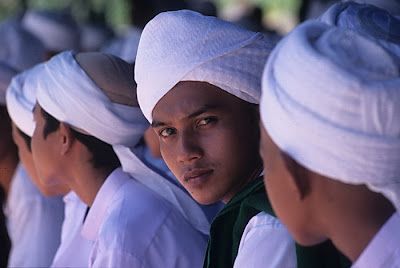Lost Lands

Young Muslim men attending the opening of a new mosque in Pattani's Yaring district. December 2006.
In Janruary 2007, the Junta's leader, General Sonthi Boonyarataklin, spoke to the local media and claimed that the military and government have access and control in all Thai territory.
He was responding to media suggestions that large portions of rural areas in the Deep Southern insurgent provinces of Pattani, Yala, and Narathiwat have become no-go areas for anyone associated with the Thai government.
There is limited truth to the General’s claim but, in reality, a crude form of autonomy has emerged in the Southern provinces.
What General Sonthi neglected to acknowledge is the fact that unless the military actually occupies a town or village with 100 or more combat troops they are not actually in control.
Soldiers and police officers have been the one consistent target of insurgent attacks and their freedom of movement has subsequently been curtailed.
The result has been a consistent retreat of government forces into heavily fortified bases and sandbagged police stations.
How such a retreat would look on a map of the Southern provinces might be similar to the appearance of islands in an ocean.
The islands would represent clusters of government forces and the vast ocean would represent territories that government forces can not travel unless moving en mass.
The large islands of government forces are congregated in the provincial capital cities of Pattani, Yala, and Narathiwat and the lesser islands would be district capitals and the occasional rural military base.
It is in the vast ocean of rural countryside that the Thai state is no longer in control. As the state’s forces have retreated into their urban strongholds a basic form of autonomy has emerged in the countryside.
Sonthi is right to claim that the military can go where they want but, the problem is, they rarely do.
Some rural villages are now starting to experience years of self-rule. It is in such quasi-autonomous villages that insurgent fighters have adopted the position of authority abandoned by the state.
It is also in such quasi-autonomous villages that virulent interpretations of Islam, imported from such places as
The pondocks (Islamic schools) that operate in the Deep Southern provinces are beyond the reach of government and religious officials so there is simply no accountability or control for schools that might be preaching hatred instead of Islam.
With the combination of separatist militants operating as village level authorities and the infiltration of radical Islam the hope that a foreseeable resolution to Southern violence will emerge is highly unlikely.
In fact, there are signs that the separatists are growing more confident.
Rumors have been circulating that one of the next acts of defiance won’t be a violent attack but will be the raising of the Islamic Republic of Pattani flag above the rural villages of the South.
To remove those flags, General Sonthi will have to dispatch combat troops to take the flags down.
But it won’t just be a couple of troops, it will have to be a major military offensive.
